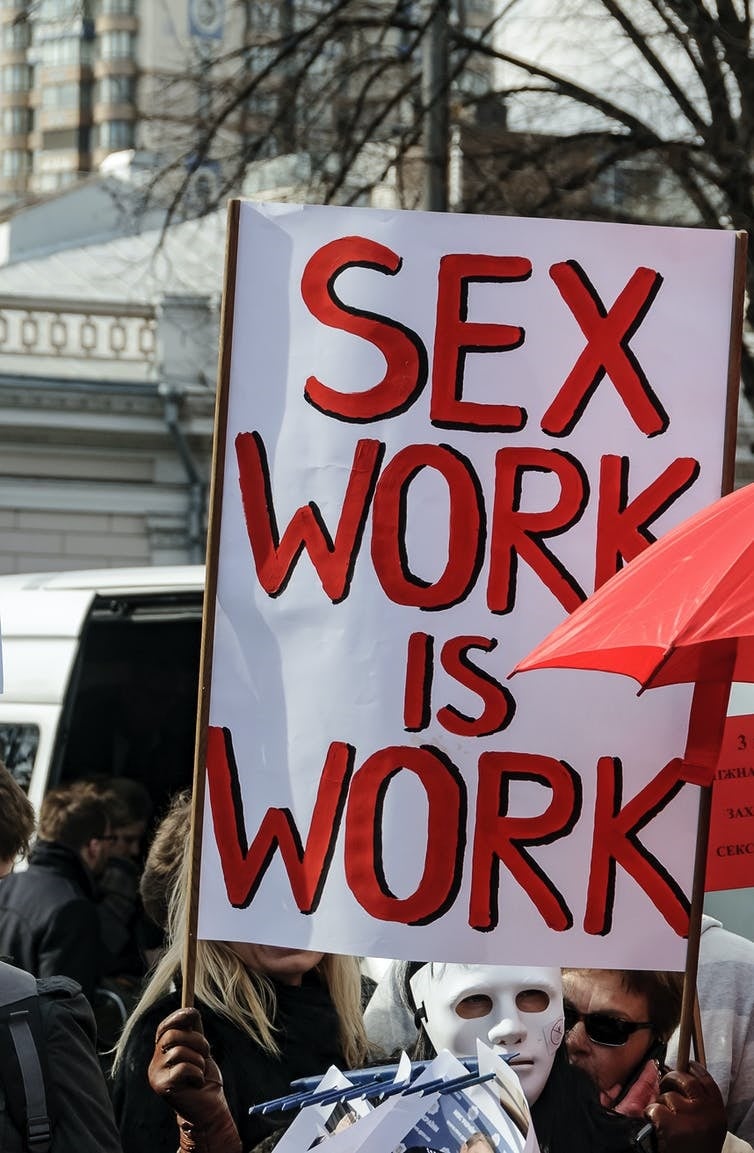
And anyone selling sex must pay taxes like everyone else. But many people in prostitution – some of whom consider themselves “sex workers” and therefore believe they should be entitled to workers’ rights and protection – are not currently eligible for state income support, despite seeing their income disappear as a result of the nationwide Covid-19 lockdown.
Sex-worker organisations are now calling on the government to create an emergency fund to help the most vulnerable among their members to survive the crisis. Understanding France’s current prostitution policy helps to explain why it is unlikely the state will agree.
Like many countries, France has introduced unprecedented measures to combat the spread of Covid-19: citizens are required to stay indoors and avoid social contact, and all non-essential businesses have either closed or switched to working from home. For people in prostitution, these new rules have led to a significant loss of income as sex workers and their clients isolate at home.
In 2016 a law was introduced that banned the purchase but not the sale of sexual services. The law was designed to signal the state’s belief that prostitution is a form of violence against women and contrary to human dignity.
But community health groups have criticised the law for increasing the stigma around and vulnerability of those working in prostitution. They argue that sex workers, and especially those who are particularly vulnerable, such as undocumented migrants and people struggling with substance abuse, have had to adopt increasingly unsafe working practices in order to survive. Competing for fewer clients, some of whom demand risky conditions such as unprotected sex, makes people more vulnerable. Having to hide from the police to protect their clients also exposes sex workers to increased violence.
Recently, aid organisations have highlighted the escalating insecurity experienced by sex workers unable to work because of the new confinement measures. Reports have emerged of sex workers being evicted from their homes because they cannot afford rent, and fewer vulnerable people are reaching out to community health organisations for food or medical help. It is not a problem specific to France and similar situations have been reported around the world, including the UK.
Shadow workers
In response to the Covid-19 lockdown, the state has agreed to subsidise up to 84% of employees’ wages, and has introduced a €1,500 per month grant for the self-employed. Sex workers who have the right to live and work in France and are registered as self-employed may be able to apply to these schemes.
However, anybody working illegally, in what is referred to as the “underground” or “shadow” economy, is excluded from workers’ benefits, including income support, despite being required to pay tax. In France, everybody who earns money through legal and illegal means has to pay tax. However, only those who work legally get workers’ benefits – including the new Covid-19 income support.
READ MORE: Camming in suburbia: It’s more common, and more dangerous, than you think
It’s a paradox: everybody works, everybody pays tax (in theory), but only some get workers rights and protection. In the current situation, anybody in the underground economy loses their work but get no benefits. This means that all mitigation measures introduced to help people with their income during lockdown are useless to part of the population.
The issue being raised by activist groups is that this will push vulnerable sex workers to continue working to earn money and put public health measures at risk since they cannot access income support. These organisations argue that setting up an emergency fund for people in this position would ensure that they can stay at home and self isolate without becoming destitute.
Although exact numbers are hard to determine, there are an estimated 30 000 people involved in prostitution in France, of which 93% are believed to be foreigners (documented or not), and many of whom are vulnerable and unable to draw on government support.
READ MORE: How Tinder is being used for more than just hook-ups
Community health groups and sex-worker organisations have begun fundraising to help out those most in need. They have also written to French President Emmanuel Macron for emergency funds to support sex workers during the lockdown as these organisations are unable to meet the demand for their help.
MPs have also written to the Marlène Schiappa, secretary of state for gender equality, to highlight the plight of sex workers during the crisis. All argue that state support is vital to ensuring that vulnerable people are not forced out of confinement to earn money, putting themselves and others at risk.
Prostitution policy
So far, the government has refused to provide special assistance to these sex workers. Schiappa has stated that it would be “very complicated” for the state to compensate individuals working illegally, including undeclared sex workers. Since the end of World War II, the French government considers all those working in prostitution (overwhelmingly presumed to be women) as victims of exploitation in need of rescue and rehabilitation, and only steps in to help those willing to leave prostitution.
READ MORE: This Real Talk app helps teens feel more comfortable about talking about sex and their bodies
The state supports people wishing to stop selling sex via a programme of social and financial aid delivered through accredited charities and women’s rights organisations. But recent research reveals this support package remains underfunded and unevenly applied. It has also been criticised for helping fewer than 100 people per year exit prostitution since the programme was introduced in 2017.
If the French state maintains its current policy position, it is unlikely to compensate vulnerable sex workers for lost income if they are unwilling or unable to leave prostitution. Instead it will continue to direct people towards its exit programme or charitable organisations for support. Yet policies that do not address sex workers’ welfare needs, or those of people subsisting in the “shadow” economy more generally, are likely to endanger lives and undermine the wider public health measures aimed at stemming the epidemic.
This article is republished from The Conversation under a Creative Commons license. Read the original article.
Follow us on social media: Facebook, Twitter, Instagram
Sign up to W24’s newsletters so you don't miss out on any of our stories and giveaway




 Publications
Publications
 Partners
Partners











